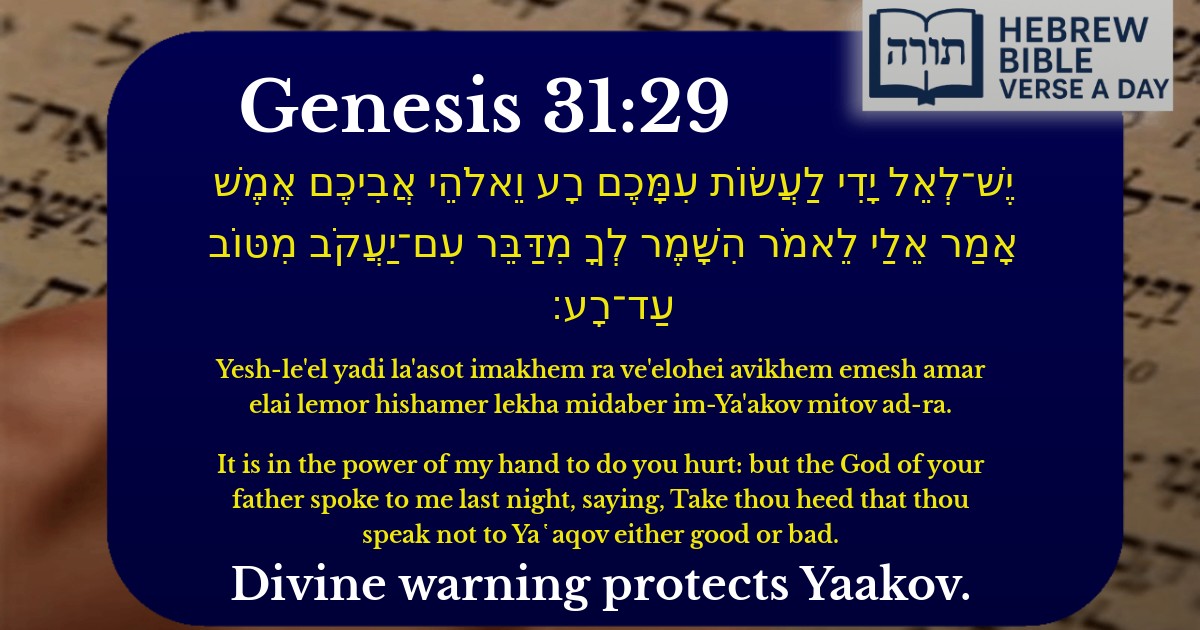Join Our Newsletter To Be Informed When New Videos Are Posted
Join the thousands of fellow Studends who rely on our videos to learn how to read the bible in Hebrew for free!
Hebrew Text
יֶשׁ־לְאֵל יָדִי לַעֲשׂוֹת עִמָּכֶם רָע וֵאלֹהֵי אֲבִיכֶם אֶמֶשׁ אָמַר אֵלַי לֵאמֹר הִשָּׁמֶר לְךָ מִדַּבֵּר עִם־יַעֲקֹב מִטּוֹב עַד־רָע׃
English Translation
It is in the power of my hand to do you hurt: but the God of your father spoke to me last night, saying, Take thou heed that thou speak not to Ya῾aqov either good or bad.
Transliteration
Yesh-le'el yadi la'asot imakhem ra ve'elohei avikhem emesh amar elai lemor hishamer lekha midaber im-Ya'akov mitov ad-ra.
Hebrew Leining Text
יֶשׁ־לְאֵ֣ל יָדִ֔י לַעֲשׂ֥וֹת עִמָּכֶ֖ם רָ֑ע וֵֽאלֹהֵ֨י אֲבִיכֶ֜ם אֶ֣מֶשׁ <b>׀</b> אָמַ֧ר אֵלַ֣י לֵאמֹ֗ר הִשָּׁ֧מֶר לְךָ֛ מִדַּבֵּ֥ר עִֽם־יַעֲקֹ֖ב מִטּ֥וֹב עַד־רָֽע׃
יֶשׁ־לְאֵ֣ל יָדִ֔י לַעֲשׂ֥וֹת עִמָּכֶ֖ם רָ֑ע וֵֽאלֹהֵ֨י אֲבִיכֶ֜ם אֶ֣מֶשׁ ׀ אָמַ֧ר אֵלַ֣י לֵאמֹ֗ר הִשָּׁ֧מֶר לְךָ֛ מִדַּבֵּ֥ר עִֽם־יַעֲקֹ֖ב מִטּ֥וֹב עַד־רָֽע׃
🎵 Listen to leining
Parasha Commentary
📚 Talmud Citations
This verse is not quoted in the Talmud.


Context and Background
This verse (Bereishit 31:29) appears in the narrative where Lavan confronts Yaakov after he flees with his family and possessions. Lavan acknowledges that he has the power to harm Yaakov but refrains because of a divine warning he received the previous night. The verse reflects the tension between human agency and divine intervention.
Lavan's Acknowledgment of Divine Intervention
Rashi explains that Lavan admits his initial intention to harm Yaakov but was restrained by Hashem's direct warning. The phrase "אֱלֹהֵי אֲבִיכֶם" ("the God of your father") is significant—Lavan does not refer to Hashem as his own God but recognizes Yaakov's connection to the divine. This highlights Lavan's spiritual distance despite his acknowledgment of Yaakov's protected status.
The Prohibition Against Speaking "Good or Bad"
The Ramban notes that the warning "הִשָּׁמֶר לְךָ מִדַּבֵּר עִם־יַעֲקֹב מִטּוֹב עַד־רָע" ("Take heed not to speak to Yaakov either good or bad") implies a complete prohibition against any interaction, whether positive or negative. This suggests that Hashem wanted to prevent Lavan from manipulating Yaakov through words, as Lavan was known for his deceit (as seen earlier in the parashah).
Lavan's Limited Power
Moral and Theological Implications
The Sforno emphasizes that this episode demonstrates Hashem's protection of the Avot (forefathers) and their descendants. Even when facing a powerful adversary, divine providence ensures their safety, reinforcing the theme of hashgachah pratit (individual divine supervision) in Jewish thought.